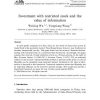Free Online Productivity Tools
i2Speak
i2Symbol
i2OCR
iTex2Img
iWeb2Print
iWeb2Shot
i2Type
iPdf2Split
iPdf2Merge
i2Bopomofo
i2Arabic
i2Style
i2Image
i2PDF
iLatex2Rtf
Sci2ools
103
click to vote
AMC
2005
2005
Investment with restricted stock and the value of information
In most public companies in China, there are two thirds of shares that cannot be traded freely in the secondary market. These illiquid shares, however, may be allowed to circulate unexpectedly one day. This paper delves into the investor's financial decisionmaking with restricted stock in a continuous-time framework. Accordingly, this paper assumes that removal of trade restriction arrives as a Poisson process. In the spirit of [Rev. Econom. Statist. 51 (1969) 247; J. Econom. Theory 3 (1971) 373], an analytical solution to the investor's optimal portfolio problem is derived and the price (or cost) of illiquidity can be calculated using numerical method. Furthermore, the value of information is discussed in this framework. Numerical simulation shows that illiquidity has an important influence on the investor's optimal strategy. This model may provide a theoretical framework to assess the cost of state-owned equities (SOEs).
Related Content
| Added | 15 Dec 2010 |
| Updated | 15 Dec 2010 |
| Type | Journal |
| Year | 2005 |
| Where | AMC |
| Authors | Weixing Wu, Yongxiang Wang |
Comments (0)

